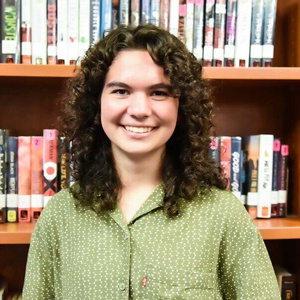by Avelyn Bailey
A newlywed couple of Carolina Wrens moved in next door. They're the first neighbors I can ever remember since I’ve lived on a secluded wooded lot just outside of Suburbia for almost my entire life. They weave their home from pine straw and grass clippings. Nestled deep within their organic home is a clutch of eggs that soon hatches, birthing four tiny Wrens with mouths open wide and adorable chirps sounding at all hours of the day. As their babies chatter, Momma and Daddy Wren hustle and bustle to gather grubs for their growing children.
The day after the Fourth of July, the grown-up baby Wrens declare their independence. One by one, they hop out of the nest they’ve known their whole life. One by one, their confidence level grows, and they each take flight. Watching them travel off into the woods beyond, I hope I’ll see them around the yard again. I’ve grown attached to them in the month since my family discovered them living in our spider plant’s pot. I hope that, next summer, they’ll return with their own mates and raise Momma and Daddy Wren’s grand babies.
Fall rolls around, bringing me back to school. On my commute every day, I see yellow-vested workers slashing trees along the road and paving over what once was the dense underbrush of the forest floor. The diverse ecological neighborhood home to the Wren family, red-shouldered hawks, white-tailed deer, wild turkeys, and bald eagles is demolished and replaced with cookie-cutter neighborhoods and warehouses. I imagine how the animals must feel. Living in untouched prosperity for years, it must be terrifying to suddenly have your home uprooted. I imagine a great bird of prey leaving her nest in the morning only to have nowhere for her to return after a construction crew chops her tree. I mourn for the doe who loses her fawn to a horrific car accident. As I ponder, my hope for the Carolina Wren family was replaced by apprehension. Can they find food when their habitat is being ripped from them in the name of human economic development? Will they be alive and well enough to return next season? If they do survive, what organism could feel capable of raising children in a failing environment? Above all, I wonder this: How can South Carolina glorify Carolina Wrens, white-tailed deer, and wild turkeys as state symbols, yet revoke their habitat and well-being in the name of economic development?
Two years pass. I see the Wrens occasionally, but their brethren never establish a nursery quite so close to my house again. I progress through my high school years, taking a special interest in my AP Human Geography class. Here, I study the nature of people, economics, and— above all— land use. I learn that houses and warehouses cropping up around me are part of the uniform landscape of urban sprawl. I learn that the spreading concrete roads are impermeable to rain and reflect heat back into the atmosphere. I learn that, when having to compete with domineering national agribusinesses, the most profitable for local farmers is to forfeit their livelihood by selling their land to developers.
Today, I have come to realize that South Carolina, in a bout of economic growth, has tarnished the wellbeing, not only of its symbolic animals, but its human citizens as well. The suburban land use patterns that usurp the natural ecosystem also gobble land for human dwellings at an unsustainable rate. The asphalt highways that kill deer, opossums, and raccoons furthermore contribute to the terrible floods and heat that only worsen each Summer. Suddenly, the trepidations I assumed the Wrens must feel as their habitat deteriorates are all too similar to my own. How long can my state’s disregard for the environment continue until my own surroundings and health crumble? Unlike my fauna neighbors, I have a voice and an education. Now, I use my voice to call for sustainable development. South Carolina needs permeable concrete instead of blacktop, clustered settlement patterns instead of suburban sprawl, and tax breaks for small businesses and not international corporations. I refuse to live in animalistic fear of impending doom. Instead, I want to have hope for the restoration and preservation of my ecological neighborhood.

About Avelyn Bailey
Avelyn Bailey is a senior at Hanahan High School, where Mrs. Sydney Gerth is her AP Literature and Language teacher. The daughter of Accalia and Ruffin Bailey, Avelyn wants to major in international studies.